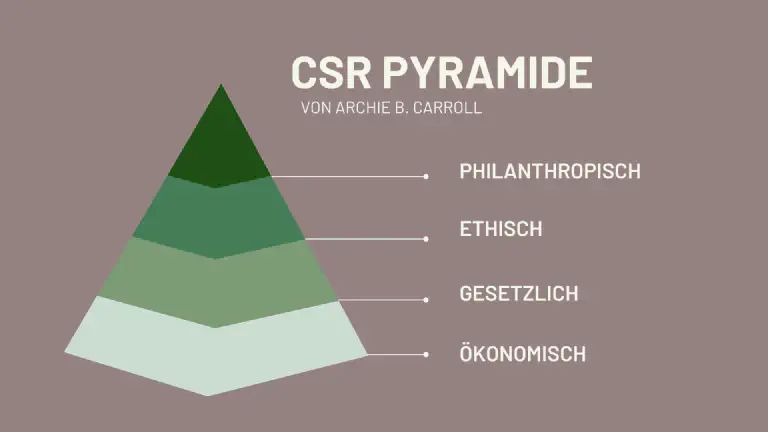In an era where the trend toward sustainability is gaining momentum, companies face the challenge of meeting their customers’ higher expectations. The growing demand for sustainable products is reflected in consumer behavior, as people increasingly value environmental compatibility and social responsibility—keyword: Corporate Social Responsibility (CSR).
Therefore, you should familiarize yourself with the basics of Corporate Social Responsibility and develop strategies for how your company can meet these new requirements. But what exactly does CSR mean, and how can you successfully implement sustainability in your business?

Companies are increasingly recognizing the importance of CSR and integrating it into their strategies.
What CSR Means #
CSR stands for Corporate Social Responsibility, which means that companies, in the spirit of sustainable business, take responsibility for their impact on society. This includes social, ecological, and economic aspects. For example, it involves fair trade, employee-focused HR policies, resource conservation, environmental protection, local engagement, and responsible supply chain management.
Corporate Social Responsibility is anchored in the ILO Declaration on Multinational Enterprises and Social Policy, the OECD Guidelines for Multinational Enterprises, the UN Guiding Principles on Business and Human Rights, the UN Global Compact , and ISO 26000 .
Key Connections Explained Briefly #
If you haven’t had much exposure to Corporate Social Responsibility, you might wonder what CSR has to do with sustainability, what Corporate Citizenship means, or why some people abbreviate the term as CR. The terminology can be confusing at first, but it’s crucial for fully understanding the concept of corporate responsibility.
- Sustainability: In practice, many companies use Corporate Social Responsibility as a synonym for sustainability. In theory, however, CSR is a narrower concept than sustainability, as it refers to a company’s specific contribution to sustainable business.
- Corporate Citizenship: This describes a company’s engagement beyond its core business, namely charitable activities. This includes sponsorships, donations, and foundations.
- Corporate Responsibility: CR has been used as a synonym for CSR for several years. Some prefer this term to avoid misunderstandings, as the “Social” in Corporate Social Responsibility is often interpreted as only social.

Sustainability is not just a trend, but a necessity for companies.
The CSR Pyramid According to Carroll #
The CSR Pyramid, developed by Archie B. Carroll, provides a detailed guideline explaining how and why organizations should fulfill their social responsibilities. The pyramid is divided into four levels:
- Economic Responsibility: This is the foundation of CSR. Companies are responsible for being profitable and creating value for shareholders. This includes generating profits, providing returns to shareholders, and ensuring financial viability.
- Legal Responsibility: Companies must ensure that their activities comply with legal requirements. This includes adhering to environmental regulations, labor laws, and consumer protection rules.
- Ethical Responsibility: This level goes beyond legal requirements and promotes ethical conduct. Companies should commit to moral principles such as integrity, honesty, and fairness, both internally and in relationships with customers, suppliers, and the community.
- Philanthropic Responsibility: The top level of Corporate Social Responsibility involves voluntary contributions to society that go beyond profit-making and compliance with laws and ethics. This can include donations to charities, investments in education or environmental projects, and promoting employee social engagement.

The CSR Pyramid according to Archie B. Carroll
The Benefits of CSR #
Implementing Corporate Social Responsibility in your company not only allows you to make a positive contribution to society, but it also brings a range of business benefits. By committing to social and environmental responsibility, you strengthen your company’s image and differentiate yourself from competitors. A positive image as a responsible company can strengthen your brand and help you attract and retain customers.
Promoting a positive work environment and engaged employees is another key benefit of CSR. By fostering a corporate culture that values social responsibility and employee engagement, you strengthen employee loyalty. Additionally, CSR initiatives can help reduce costs by lowering energy consumption, reducing waste, or promoting more efficient supply chains.
Overall, integrating CSR not only helps you make a positive contribution to society, but also provides direct business benefits that can make your company more successful.

CSR should be an integral part of corporate culture.
Challenges in Implementing Corporate Social Responsibility #
On your journey to a more sustainable company, you may encounter some challenges. For example, additional costs may arise if you send employees to training or continuing education.
Sustainability goals can take a long time to achieve, and it can be demotivating if progress is slow. Engaging in charitable activities can also mean additional effort.
Examples of Suitable Measures #
As part of their Corporate Social Responsibility (CSR), companies can take a variety of actions. These measures help make a positive impact and position the company as socially responsible and sustainable. Here are some concrete examples:
-
Flexible work models
-
Electric vehicles as company cars
-
Donation campaigns
-
Reducing business travel
-
Recycling and waste reduction
-
Renewable energy
-
Employee training and development
-
Reducing emissions
-
Educational scholarships
-
Defining core values

CSR requires long-term commitment and continuous review.
Why CSR Reports Are Essential #
CSR reports are an essential tool for transparently documenting and communicating your Corporate Social Responsibility efforts. In these reports, you can record which measures you have successfully implemented and which goals you are pursuing for the future.
By creating these reports, you ensure transparency and allow your stakeholders to better understand your company’s impact on the environment and society. This can build trust in your company and give you a crucial competitive advantage.
SeaTable Template #
To set concrete goals and track your progress, the free SeaTable template is ideal. In the template, you can enter your goals, categorize them, and assign them to departments. In addition to planned measures, you can also set priorities and enter a target date.
With another table, you can keep an overview of all key figures and instantly see which areas you’ve already improved. You can also document sustainability certificates you’ve already received or are working toward, and automatically generate the next renewal date.
To use SeaTable, simply register for free . You can then add the template to your base and enter your own data.
